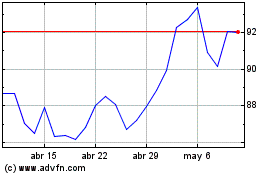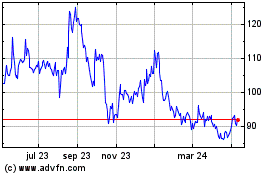By Yaroslav Trofimov and Summer Said
DUBAI -- The Persian Gulf island nation of Bahrain, battling a
sharp resurgence of Covid-19 despite high levels of inoculation
with a Chinese-made vaccine, has started giving booster shots to
vulnerable citizens using a different vaccine made by Pfizer Inc.
and BioNTech SE, a senior official said.
Waleed Khalifa al Manea, Bahrain's undersecretary of health,
said the vaccine manufactured by state-owned Chinese drugmaker
Sinopharm, which has accounted for more than 60% of Bahrain's
inoculations so far, was providing a high degree of protection.
More than 90% of people hospitalized in the current Covid-19 wave,
the worst the country has faced, hadn't been vaccinated, he
said.
Still, Dr. al Manea added, Bahrain residents who are over 50,
are obese or have chronic illnesses now are being urged to get
another shot six months after their full Sinopharm vaccination --
with the Pfizer-BioNTech vaccine. The government started offering
the boosters at the end of May, he said.
Bahrain, which has made the Pfizer-BioNTech vaccine available to
unvaccinated residents for months, will continue to offer the
choice of Sinopharm to those who prefer the Chinese vaccine, Dr. al
Manea said. The government's BeAware app allows users to book a
Sinopharm booster shot, but says that Pfizer-BioNTech is
recommended for more-vulnerable population groups.
Sinopharm and other Chinese vaccines have become key tools of
Beijing's international diplomacy, especially in developing nations
unable to secure sufficient doses of U.S. and European-made shots.
Sinopharm and another shot, manufactured by Sinovac Biotech Ltd.,
have already received emergency approval from the World Health
Organization.
The two vaccines are manufactured with inactivated virus, a
long-used technique for making vaccines. The Pfizer-BioNTech shot
relies on a new technology employing messenger RNA.
Published clinical data on Sinopharm's efficiency among the
population groups most vulnerable to severe disease is scant. The
vaccine's main clinical trial involved 40,382 participants in the
Middle East, most of them in the United Arab Emirates.
The study's peer-reviewed results, published on May 26 by the
Journal of the American Medical Association, found 78% efficacy
against symptomatic disease for one of two versions of the
Sinopharm vaccine. However, the cohort was made up mostly of
healthy young men -- the participants' mean age was 36 -- and the
study reported only two cases of severe disease, a statistically
insufficient amount, in the placebo group.
"Conclusions about prevention of severe cases cannot be made,"
the study said, adding that it "could not address the question of
whether the inactivated vaccines prevent against asymptomatic
infection." With no participants older than 60 developing an
infection, the study also had no data on whether Sinopharm's
vaccine works in that age group.
In a separate, unpublished, real-world study of Sinopharm in
Serbia, 29% of 150 participants were found to have zero antibodies
against the virus three months after they received the first of two
shots of the vaccine. The average age of the people who
participated in the Serbian study was higher than 65.
"The Sinopharm vaccine is not immunogenic enough, and it appears
that its impact is especially low on elderly recipients," said
Olgica Djurkovic-Djakovic, the doctor who headed the study at the
University of Belgrade and shared the findings with The Wall Street
Journal. Ten people out of the 150 who received Sinopharm and
participated in the study contracted Covid-19, she said.
Sinopharm, which hasn't responded to requests for comment for
this article, said in March that it was studying whether to
recommend a third booster shot, without sharing details. The
company hasn't publicly addressed questions about its vaccine's
efficacy since then. Chinese Foreign Ministry spokesperson Hua
Chunying, asked at a May 12 press briefing about a Journal article
on a virus spike in the Seychelles, another nation heavily
dependent on Sinopharm, said such reporting "exposes their
unhealthy mind-set of denigrating China at every turn."
In Bahrain, daily Covid-19 deaths have leapt to 12 per million
people in recent weeks -- an outbreak nearly five times more lethal
than India's -- prompting the island nation's government to shut
down shopping malls and restaurants in an effort to limit the
spread. Dr. al Manea attributed this upsurge to holiday
celebrations during and at the end of the Muslim holy month of
Ramadan. "The infections came mainly from family gatherings -- we
had Ramadan, which is a very social event in Bahrain."
One of the world's vaccination leaders, Bahrain has fully
vaccinated 47% of its people, more than the 41% vaccination rate in
the U.S. or the 38% in the U.K.
The Seychelles, an Indian Ocean archipelago that became the
world's most vaccinated nation due to donations of the Sinopharm
vaccine from the U.A.E. and of an AstraZeneca PLC shot by India,
with 65% of the population fully vaccinated, also saw cases and
deaths surge to records in May. The WHO pointed out that most of
those who had fallen sick with Covid-19 there were either
unvaccinated or had only received their first dose. The Seychelles
health ministry said it is considering administering a third
booster shot to vulnerable residents.
The U.A.E. said in March that it already began administering a
third booster shot of Sinopharm to some residents who failed to
develop antibodies with the first two. In the U.A.E., where
Sinopharm accounts for the majority of administered vaccines,
unvaccinated residents -- like in Bahrain -- can now choose which
vaccine to take.
In Dubai, the most populous of the seven members of the U.A.E.,
the emirate's health authorities have also quietly begun
revaccinating with Pfizer-BioNTech those residents who had been
fully inoculated with Sinopharm, according to dozens of
recipients.
Dubai resident Brindha Satheshwaran, 42, was vaccinated with
Sinopharm in January and said she felt protected until her husband,
also inoculated with the Chinese vaccine, took an antibody test
that turned out to be negative. She said they both decided to get
two doses of Pfizer-BioNTech, and received the first of them in
late May.
"Several people I know are finding out they have not developed
antibodies after Sinopharm and are rushing to book to get Pfizer,"
Ms. Satheshwaran said.
In its initial report on Phase 3 trials of Sinopharm, the U.A.E.
government said in December that the vaccine offered 86% protection
against symptomatic disease and 100% protection against moderate
and serious disease.
Largely on the strength of the U.A.E.-led clinical trials in the
Middle East, Sinopharm has signed contracts to sell 175 million
doses to countries that range from Egypt to Hungary to Argentina,
while donating another 18 million, according to Beijing-based
Bridge Consulting. Dubai ruler Sheikh Mohammed bin Rashid al
Maktoum, Serbian President Aleksandar Vucic and Philippine
President Rodrigo Duterte are among several national leaders to
have publicly taken the Sinopharm shot. Several nations are
building vaccine plants to manufacture Sinopharm locally.
Impressed by initial promises of 100% protection against severe
Covid-19, Dubai-based Egyptian consultant Eman Shaaban, 38, said
she pulled out all stops to get U.A.E. residency for her mother
Rawya el-Sayyed, 67, so she would be able to get vaccinated with
Sinopharm.
Ms. Sayyed, who had high blood pressure and Type 2 diabetes,
received both doses, returned to Cairo in March, and contracted the
disease during Ramadan, which began on April 13 in Egypt. She died
on May 16.
"I did not really see this coming until she was put on a
ventilator, because everyone was saying: Vaccines protect you from
death," Ms. Shaaban said.
--Bojan Pancevski and Chao Deng contributed to this article.
Write to Yaroslav Trofimov at yaroslav.trofimov@wsj.com and
Summer Said at summer.said@wsj.com
(END) Dow Jones Newswires
June 02, 2021 17:18 ET (21:18 GMT)
Copyright (c) 2021 Dow Jones & Company, Inc.
BioNTech (NASDAQ:BNTX)
Gráfica de Acción Histórica
De Mar 2024 a Abr 2024

BioNTech (NASDAQ:BNTX)
Gráfica de Acción Histórica
De Abr 2023 a Abr 2024
